Date Updated:02/05/24
At this stage, you have researched the pros and cons of a franchise business and are now seriously considering franchising as a way into business.
To be a successful franchisee you would have to be the type of person who can accurately stick to someone else's system, without wanting to make changes. You will be starting your business using someone else's know-how and expertise gained over years of running a mirror image business and on top of it you don't have to worry about developing the system, the franchisor does that. You will however have to manage, promote, market and sell as well as millions of other tasks that have to be done in running small businesses.
In this second step we look at whether franchising is the right route into self-employment for you? We provide questions to help you to self-evaluate your personal circumstances and give you access to our franchise self-test. We also look at the benefits of becoming a franchisee and what a franchisor looks for in a franchisee.
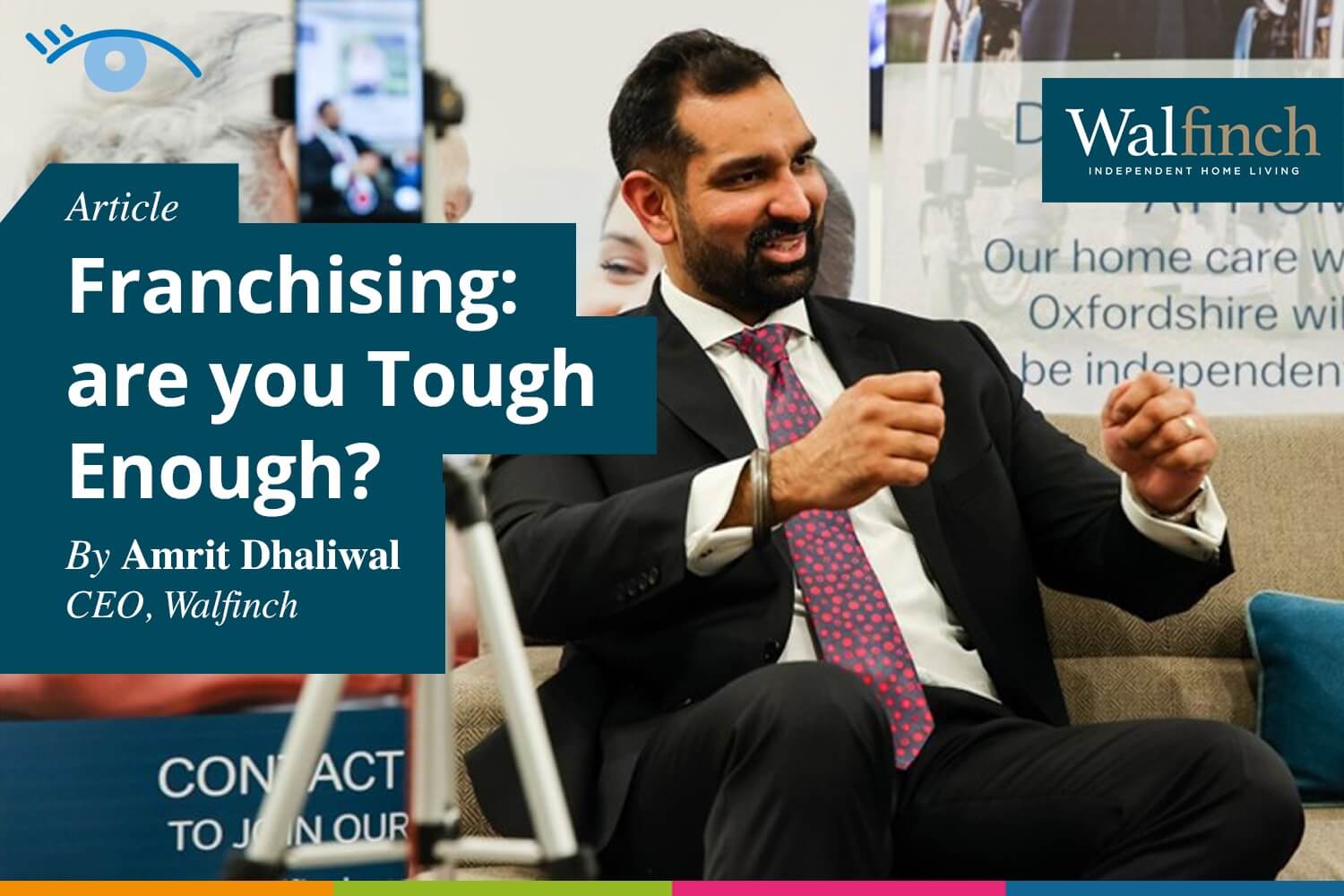
If you’re looking to start your own business and you want to mitigate the risks involved when starting from scratch, franchising is for you. With a proven business model, an established brand, and ongoing support from the franchisor, you have a higher chance of success than if you go it alone.
However, success in franchising requires more than just signing a franchise agreement and paying the franchise fee. It takes determination, resilience, adaptability, a go-getter attitude, and passion to run your business. If you embody these characteristics, you could be tough enough for franchising.
What does toughness mean?
Running a business requires a lot of effort and hard work. There will be times when things don't go as planned, and it can be easy to give up. You might experience a dip in sales or lose a couple of key employees in quick succession. If you can persevere through difficult times, and remain focused on your goals, you are more likely to achieve success in business. Sometimes, this will mean working long hours and taking on additional responsibilities, but this will come easy to you if you’re determined to make your business a success.
You will also be a leader, instilling your determination in your staff. You and your staff should embody a drive to give your customers and clients top quality service. Embedding this culture of determination in your business will undoubtedly drive you forward.
Success comes more easily when you’re proactive, motivated, and always looking for new opportunities to improve your business. Sitting back and waiting for things to happen will benefit no one. If you show initiative, ask questions of your franchisor, and work together to increase profits while maintaining customer satisfaction, your business will go from strength to strength.
Having an open mind is important too because you’ll be subscribing to someone else’s ideas. This shouldn’t stop you from suggesting and trying new things. Starting a business is always a gamble, but if you’re willing to take calculated risks in order to achieve success, this will benefit your business in the long run.
Understand your Target Market
Being determined and driven is all well and good, but if you don’t have a deep understanding of your target market and their needs, you could struggle.
Your understanding of the sector you’re buying into will help capitalise on sales and marketing opportunities. If you have a strong desire to continue after thoroughly researching your target market, you should push ahead.
Who can buy a Franchise?
It goes without saying that regardless of your race or sexual orientation, if you embody the drive and determination to succeed, paired with a deep understanding of your customer-case, you have the potential to succeed in franchising.
You should feel confident enough to draw on your own lived-experiences to help you grow your business, no matter where you’re from or who you are. Diversity in franchising makes life more exciting, more cosmopolitan and enables us to connect with customers from anywhere and everywhere!
Becoming a successful franchisee requires more than just enough money to afford to buy a business. It takes a combination of traits, skills, and positive habits that enable you to overcome challenges, seize opportunities, and grow your business. While the franchisor provides a solid foundation, it's up to you to build on that and inject into your business your creativity and personality and your own background and culture. If you’re willing to develop these qualities and have the courage to take on the challenge of running a business, you might just be tough enough for franchising.
Find out more about opportunities with Walfinch...
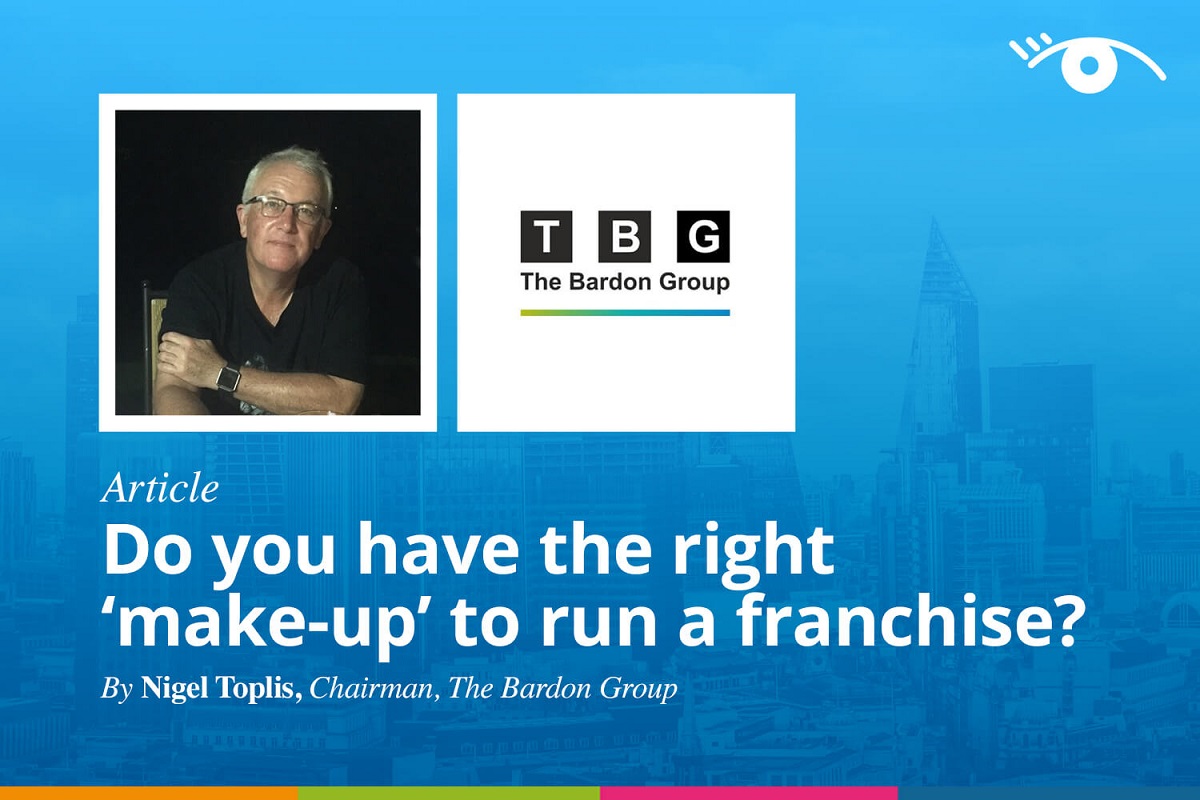
Just because you want to run your own business doesn’t mean you are capable.
You may have the funding to buy into a franchise BUT do you have the ‘mentality’ to do yourself and the business justice?
Whilst you’ll be researching your chosen franchise business and speaking to banks, advisors, existing franchisees and doing your due diligence, the franchisor should at the same time be doing their due diligence on you.
YES, the franchisors assessment of you is important but even more critical is your own assessment of yourself, your strengths/weaknesses and above all your mentality.
I pulled together this ‘cheap and dirty’ Q7A for prospective franchisees to assess if they have the ‘make-up’ to be a franchisee.
12 questions with two points for each answer (rules for marking are at the end). If I took the test, then I would want to get to 20 points to be comfortable that I have the right mind set to be a franchisee.
Take the test – it will only take you five minutes. There are 12 questions – all binary – agree or disagree.
ANSWER THE QUESTIONS HONESTLY.
- I sometimes feel I’ the victim of outside forces - AGREE/DISAGREE
- Generally, I work later than I plan - AGREE DISAGREE
- Some days I feel I’ve achieved nothing - AGREE /DISAGREE
- I will always try to get something positive from a poor situation - AGREE /DISAGREE
- I like order and regular hours - AGREE /DISAGREE
- I don’t like relying on other people - AGREE /DISAGREE
- I will take risks if I’ve weighed up all the potential issues - AGREE /DISAGREE
- If I start something I will see it through - AGREE /DISSGREE
- I will generally consider other people’s views - AGREE /DISAGREE
- I temper my ambition to avoid disappointment - AGREE /DISAGREE
- I get real satisfaction leading a team - AGREE /DISAGREE
- I only care how much money I make - AGREE DISAGREE
If you answered YES to questions 2,4,7,8,9,11 then give yourself two points for each.
If you answered NO to any of the others, then also award yourself two points each.
The above is not sophisticated BUT frankly if you only scored 10 points would you be confident of running a business? No, nor would I.
About Nigel Toplis
Nigel Toplis is Managing Director of The Bardon Group stable of franchises which includes Kall Kwik, Recognition Express and Techclean. The Group specialises in developing and growing franchised businesses in the UK.
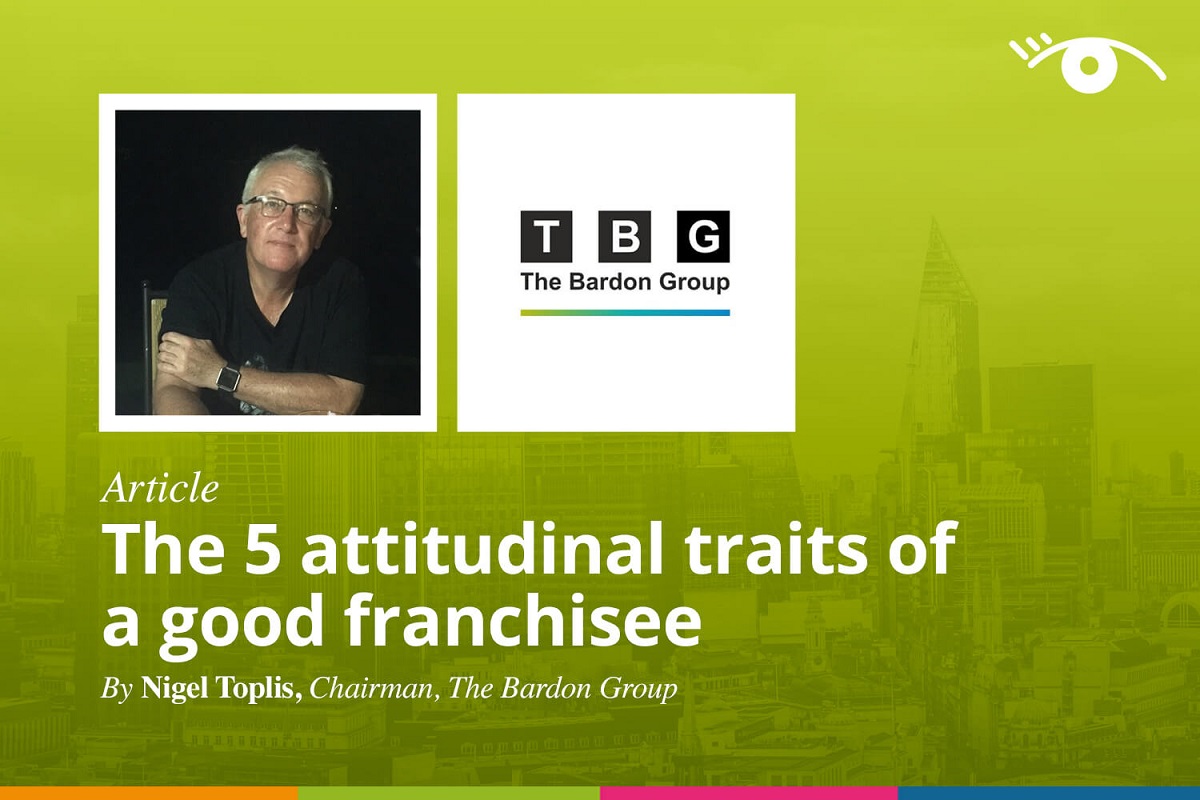
Without the right attitude you will fail – simple!
So, you’ve done all your research, you’ve done your due diligence and you’ve decided that you want a franchise. All good so far, except you may simply not be cut out for it.
You might seem to have all the right attributes – you’re intelligent and highly skilled with enough cash behind you. But all of these things count for nothing unless you have the right attitude for franchising.
Let’s be honest, as a franchisor it is very tempting to take on people who are skilled, bright, keen with plenty of cash. But I’ve learned over the years that to do so is dangerous, foolhardy and brings only short-term benefits. In the long run the downsides for both the franchisor and the franchisee are irrecoverable.
So, what is the right attitude? And how do you know if you have it?
The five attitudinal traits of a good franchisee
In 30 years of franchising, I’ve had the pleasure of working with some fabulous franchisees – from ex-greengrocers to BA stewards to a cattle rancher from Patagonia to ex-nurses – all of whom have built prosperous, fulfilling businesses.
That said I’ve also worked with plenty of people who ticked all the right boxes, but never really seemed to take off and over these years I’ve come to realise that there are five core characteristics that distinguish a great franchisee.
- Wholehearted commitment – buying into a franchise is not like starting a new job. There’s no ‘9 to 5’, no ‘switching off’ and no ‘leaving it to somebody else’. It requires serious 100% commitment, and it could change your whole lifestyle. You need to recognise this, and so do your family.
- Realism – it’s good to be ambitious, but you also need to be brutally honest with yourself when assessing your skills, work ethic and financial resources. A broad skill base is more important than specialist knowledge. It’s also important that you are organised, disciplined, hard-working and personable. Please don’t stretch your finances too far when buying a franchise – if you start out with a huge debt it will add too much pressure!
- An enterprising personality – franchisors don’t want entrepreneurs. Franchising is about following a proven system, not inventing a new one. But we do want people who are energetic and outgoing. If you have a positive disposition, enjoy being active and solving problems, the chances are you’ll make a good franchisee.
- Drive – you need to be a self-starter and a team player. You should be goal-oriented and able to handle responsibility. Yes, you’re buying into an existing business idea and model, but it is still your business – you’re the one who has to make it work. If you’re committed, realistic, enterprising and driven then you may well have what it takes to be a successful franchisee. But there’s one attribute that trumps all the others:
- Collaborative – franchisees who recognise the value of working closely with the franchisor will always be more successful than those who ‘plough their own furrow’. The franchisor has created, tested and run a successful and proven business model. So, work with the system. Don’t waste your valuable time reinventing the wheel.
Very few people possess the full spectrum of attributes and skills that any given franchisor is looking for. But some things are more important than others.
As a franchisor we will work with you if you are shy; we will teach you new business skills if you lack in certain areas and we will give you the tools and the ongoing support to enable you to build your business.
A franchisor is like your spouse. They care, they want you to be successful - so take advantage of their experience, knowledge and support.
if you believe that your way is better or the franchisor just interferes, then the relationship is likely to lead to an early divorce or certainly poor business development – so better you don’t buy a franchise if you think you know better or if you have a ‘maverick’ disposition.
A good franchisor wants you to succeed and will help you do so. Choose your franchise well, work closely with the franchisor, and get ready to roll your sleeves up!
About Nigel Toplis
Nigel Toplis is Managing Director of The Bardon Group stable of franchises which includes Kall Kwik, Recognition Express and Techclean. The Group specialises in developing and growing franchised businesses in the UK.
Is experience required in franchising?
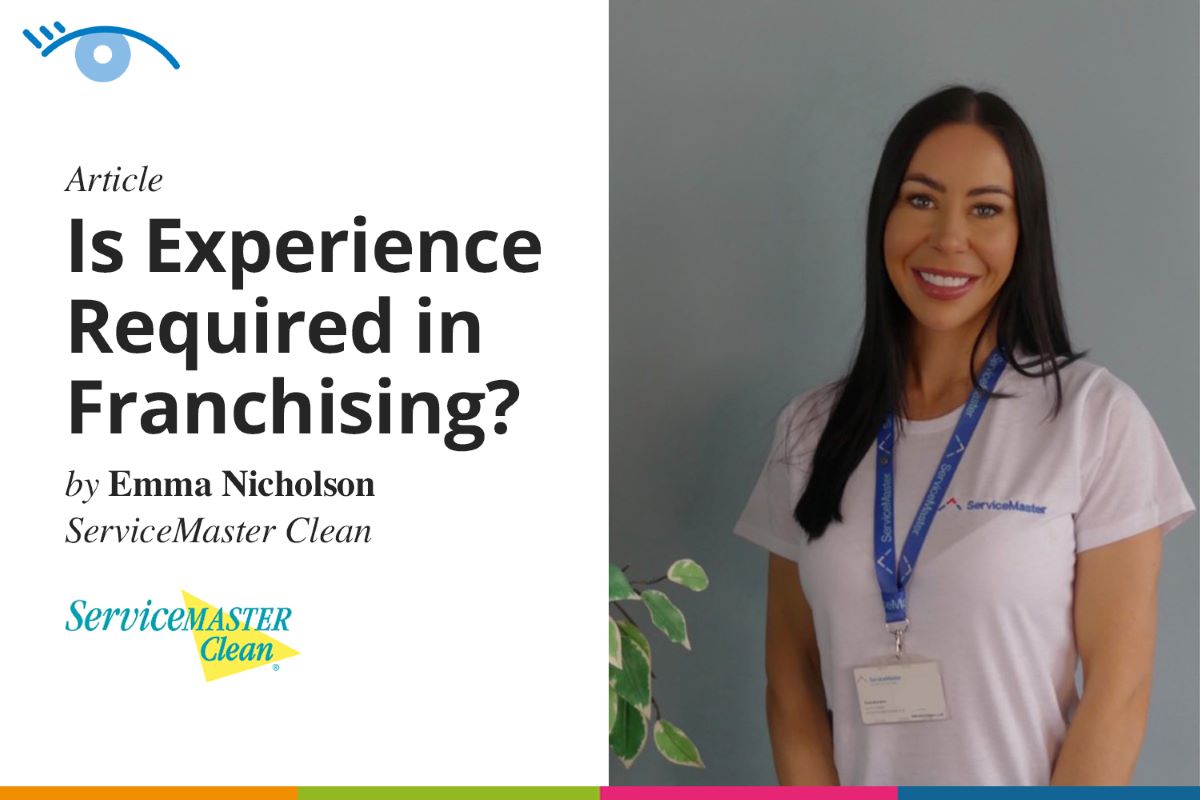
Franchising presents an enticing opportunity for aspiring entrepreneurs to own and operate their own business under an established brand.
One common question that arises for those considering franchising is whether prior business experience is necessary. The short answer is: it depends.
While experience can be beneficial, many franchises are designed to welcome newcomers to the business world. Let's explore this topic in more depth.
The Appeal of Franchising for Newcomers
Franchising has long been touted as a path to business ownership that's more accessible than starting a company from scratch. One of its key selling points is the built-in support system that franchisors provide to their franchisees.
This support often includes:
- Comprehensive training programs
- Proven business models and systems
- Marketing and advertising support
- Ongoing operational guidance
These features make franchising an attractive option for individuals who may lack extensive business experience but have the drive and determination to succeed as entrepreneurs.
When Experience Matters
While many franchises are open to inexperienced operators, there are certainly situations where prior experience can be advantageous or even required:
- Complex Industries: Some franchises operate in industries that demand specialised knowledge or skills. For example, automotive or technology-based franchises might prefer candidates with relevant technical backgrounds.
- High-Investment Opportunities: Franchises that require significant upfront capital may scrutinise a candidate's business acumen more closely to ensure they can manage the financial aspects effectively.
- Management-Heavy Concepts: Franchises that involve managing large teams or multiple locations often seek individuals with prior leadership or management experience.
- Rapid Growth Plans: If you aim to become a multi-unit franchisee quickly, having a track record in business expansion can be a significant asset.
The Franchisor's Perspective
From the franchisor's standpoint, the ideal franchisee possesses a mix of qualities that go beyond just experience. These often include:
- Alignment with brand values and culture
- Strong work ethic and dedication
- Financial stability and access to capital
- Willingness to follow the established system
- Good communication and interpersonal skills
Many franchisors believe they can teach the specifics of their business model to the right individual, even if that person lacks prior experience in the industry.
Success Stories of Inexperienced Franchisees
The franchising world is full of success stories from individuals who entered with little to no prior business experience. These newcomers often bring fresh perspectives, enthusiasm, and a willingness to learn that can drive success. Their achievements highlight that with the right attitude, work ethic, and support system, inexperienced individuals can thrive in franchising.
Overcoming the Experience Gap
If you're interested in franchising but worried about your lack of experience, consider these strategies:
- Start with a Franchise that Welcomes Newcomers: Many franchises, particularly in the food, retail, and service sectors, are structured to accommodate first-time business owners.
- Leverage Transferable Skills: While you may not have direct business ownership experience, skills from previous careers or life experiences can be valuable. Leadership, customer service, and problem-solving abilities are highly transferable to franchising.
- Do Your Homework: Thoroughly research the franchise opportunities you're considering. Understand the day-to-day operations, challenges, and success factors for the business.
- Seek Mentorship: Connect with experienced franchisees or business mentors who can provide guidance and insights as you navigate your new venture.
- Embrace the Learning Process: Be prepared to immerse yourself in the franchisor's training programs and ongoing education opportunities. A willingness to learn and adapt is often more valuable than prior experience.
The Verdict
While experience can certainly be an asset in franchising, it's not always a prerequisite for success.
Many franchise systems are designed to provide comprehensive training and support, enabling individuals from diverse backgrounds to become successful business owners.
The key is to find a franchise opportunity that aligns with your skills, interests, and goals. Be honest about your strengths and weaknesses and choose a franchise that offers the level of support you need.
Remember, every experienced business owner was once a beginner. With the right franchise partnership, dedication, and willingness to learn, you can overcome the experience gap and build a thriving business.
Ultimately, franchising opens doors for individuals from all walks of life to become entrepreneurs.
Whether you're a seasoned business professional or a newcomer to the world of commerce, there's likely a franchise opportunity out there that's right for you.
The question isn't so much whether experience is required, but whether you have the passion, commitment, and willingness to learn that are the true foundations of franchising success.
Assessing yourself to be a franchisee
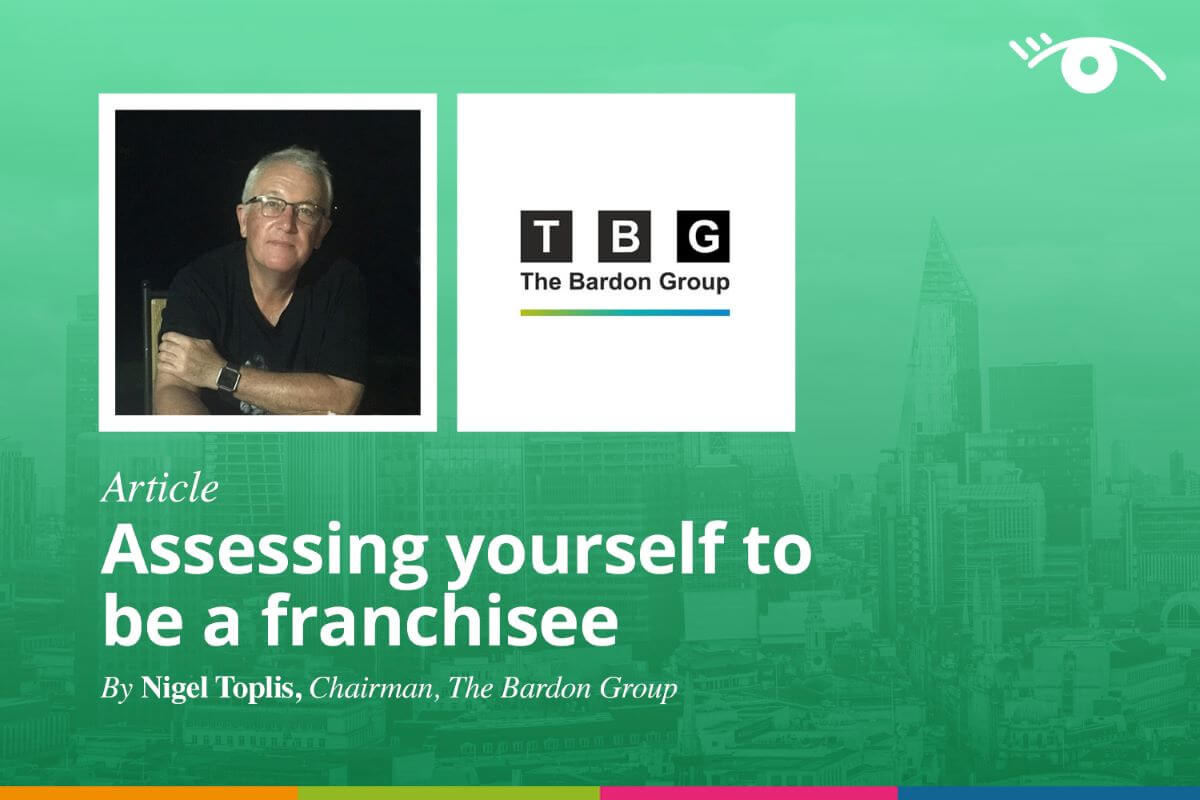
Let’s be clear from the start – franchisors want successful franchisees.
There is NO value to a franchise system if franchisees are simply not cut out to be in business and even the best franchise system will find it hard to cover the cracks of a franchisee who is obviously unsuited to the business.
So, the process of recruitment is absolutely essential.
To this end, any self-assessment is critical when considering taking a franchise. YOU need to know that you believe you can make a success of the business.
There are many areas to consider and things you never thought warranted a second glance, that you need to think about. If nothing else the whole process of self-assessment can be therapeutic!
For me, one of the hallmarks of a successful franchisee is energy. Running a successful business takes long hours, total focus and a high level of drive – so energy is critical.
Are you prepared for the long hours? Do you have the energy required? Can you give the business your full attention and focus?
What about your family? Will your family will support this redirection – with your energy, drive and focus going into a business and not into themselves.
Shy people tend to find running a business more difficult, whilst arrogant/over-confident (‘know it alls’) people tend to make the worst franchisees.
In my 23 years of franchising I can safely say that the most successful franchisees, the ones who extract the most out of their businesses tend to be those who put their energy and focus into absorbing and following the franchisors proven business systems and NOT fighting to ‘do their own thing’.
So, having the energy and channelling said energy into the right areas is a good start – but of course it is only a start if you can raise the finance to fund the franchise.
You need to be sure that you can afford the business – do not go into the business with no ‘wiggle room’ – rest assured you will need it.
The good news is that the major banks all have experienced franchise people and will advise on funding expectations. For s solid, reliable franchise brand you would expect funding of 70% of the total investment required.
Before going to the bank however you need to calculate your ‘own available funds’ (OAF) – to ensure you can both fund the 30% balance and have some working capital for the first few months trading. Moreover, part of your OAF needs to be in cash.
Liquidity, allows you to move more quickly and allows you to fund higher priced franchises.
Of course, having funds is great and having access to liquidity also great BUT on the debit side you need to consider your on-going FIXED COSTS. Obviously the higher the fixed costs the then the more pressure on the business to produce cash quickly –and this may be an unreasonable expectation.
SO, before you commit, take a good long hard look at your fixed commitments and ask yourself the question – are they really fixed OR could I do without them!
The final thing you should consider when assessing your own situation is ‘relocation’.
Ask yourself this question – are you, is your spouse, are your children prepared to move house, friends and schools for the sake of a new business.
In my mind the willingness to relocate for the right business opportunity is a simple decision, and I have previously made on more than one occasion and is I believe clearly the correct one.
However, all circumstances are difference and you need buy-in from all parties.
When assessing a franchise opportunity is it not the business that often warrants closest inspection but rather yourself.
- Do you have the energy, the commitment, the willingness to follow a system?
- Can you afford the business? Do you have personal funds – both asset and liquid to support yourself?
- Are you prepared to reduce your ‘fixed’ cost base and take some emotional pain?
- Would you be prepared to relocate for the right business opportunity?
- Finally, do you have it in you to make the hard decision?
Evaluate yourself for franchising
Though franchising is a very appealing business start-up option, it is not, however, for everyone. Before you decide to go down the franchise route and start to consider which franchises are a good fit for you, you first need to identify and be absolutely sure that franchising is right for you.
Below is a list of questions you can ask yourself. Asking these should give you a better understanding as to whether you could be a franchisee. You should also discuss them with your partner or family members as their input could be invaluable.
What physical condition are you in? Are you healthy? Do you suffer from any illnesses that could affect your ability to run your own business?
Franchising is more than a 9-5 job. It is your business so you will need to put in long hours and work weekends if required. If you are not in good health or suffer from an illness that could affect how you perform as a business owner, then franchising may not be for you.
How much of your assets are you willing to risk in a franchise business?
You need to calculate the value of your assets including savings, redundancy pay, car, house etc, and then work out how much you can risk losing. You will need to put a lot of your own capital into the business; can you afford to lose this? Can your family afford to lose it? What will happen if you do lose all your money? This is the worst case scenario but one you need to consider.
How much working capital can you afford to put into the business? What are your current financial commitments i.e. do you have a mortgage, loans, bills etc. If you had a drop in income, which can be common at the start of a business venture, could you afford this?
During the early months of new business cash flow problems may result in income from the business being lower than expected. Are your financial commitments such that you could manage on less income than you have now?
Is your partner or family willing to give you full support? Are they happy to share the risks with you?
There are always problems and difficult periods even in a successful franchise, and it is during these times that you may need a bit more family support than usual. It may be an idea to ask them to list their concerns so you can look at them in more detail.
Is your partner or family aware of the disruption to the family life that starting a new business can bring?
This disruption could range from a few missed meals to the abandonment of an annual holiday and the working of long hours. Ask them for reactions to these possibilities.You should of course have discussed the franchise idea fully with your partner. Many franchisors positively encourage the involvement of spouses or partners in their discussions with franchisees. But you should also ask yourself whether your relationship would stand the strain of the sacrifices, which are inevitably involved in starting your own business. Be sure your partner is not going along with your ideas just to make you happy; make sure he or she is as committed as you are.
How many extra hours above a standard 40 hour week would you be prepared to work as a franchisee?
As you will be aware, running a franchise could involve you in much more than a 9.00am to 5.00pm, weekday job. You may have said that you would be willing to work 20 or more hours extra. Is this realistic - what would you give up in a week to work those extra hours? If you said 2 or 3 hours or more, do you really have the commitment necessary to succeed in a new venture? It is your business and you will be responsible for all your decisions you have to spend all of the hours necessary to make the business work.
What reaction would you have to receiving strict guidelines by the franchisor on how to run your business?
If you value a high degree of autonomy and want to make your own decisions on how to run and develop business, then franchising is possibly not for you. The franchisor is in ultimate control and resentment of this in your part will make the relationship very difficult.
What involvement would you expect from the franchisor in resolving problems encountered in running the franchise?
Although the franchisor should help you with certain types of problems, do not expect assistance with all your minor difficulties. If you expect a large degree of assistance you should choose a franchise very carefully, selecting one which is well established and with well-defined systems for operating the business.
If you see improvements could be made to the environment in which you work, how determined would you be to change them for the better?
In running a franchise business, you will be expected to go by the rules, not change them. A franchisor will object vigorously if you try to 'personalise' the business. If you will be unable to resist making changes, then think again?
What would be your reaction to do tasks, such as serving food or cleaning tables?
You may need to do a lot of the dirty work yourself, particularly in the early days. If you don't want to get involved, make sure that profit margins are sufficiently high to enable you to take on staff.
In your present employment are you used to taking financial decisions?
The franchisor will be concerned if you have had little or no financial experience. Are you convinced that you have the necessary financial skills and knowledge?
Do you think you have the talent and skills that is required to market and sell your service or product?
Similarly, are you capable of selling and marketing your business? Are you sufficiently creative? A franchisor will be reassured if you have had some experience.
How good do you think you are at motivating staff?
If you have had problems with staff in the past and have blamed them, are you sure the problems were with the staff and not in the way that you dealt with them? Again, some franchisors may be concerned if you have had no experience of staff management.
Have you had frequent changes in jobs?
If the answer to this question is yes, are you sure that franchising is something you really want to commit yourself to and that you aren't just looking for yet another change? On the other hand, if you haven't moved jobs a few times in your career, are you sure that you are suited to the different lifestyle, which you may face?
What are your feelings on job security?
Some people like a lot of job security, whilst for others this is not important.Think carefully if you don't like insecurity, are you prepared to give up the comfort of receiving a regular wage.
The Benefits of Becoming a Franchisee

Have you ever dreamed of owning your own business but felt overwhelmed by the risks and challenges?
Enter franchising – a business model that offers aspiring entrepreneurs a unique blend of independence and support.
As a franchisee, you can harness the power of an established brand while building your own success story. Let's explore the compelling benefits that make franchising an attractive option for budding business owners.
Proven Business Model
One of the most significant advantages of becoming a franchisee is access to a tried-and-tested business model. Instead of starting from scratch, you're stepping into a system that has already overcome initial hurdles and refined its operations. This proven framework significantly reduces the risk of failure and provides a clear roadmap to success.
Brand Recognition and Established Customer Base
Imagine opening your doors on day one with customers already familiar with your brand. That's the power of franchising. You benefit from the franchisor's established reputation and marketing efforts, giving you a head start in building your customer base. This instant recognition can be a game-changer, especially in competitive markets.
Comprehensive Training and Support
Franchisors have a vested interest in your success and provide extensive training to ensure you hit the ground running. From initial business setup to ongoing operations, you'll receive guidance on everything from management techniques to customer service best practices. This support continues throughout your journey, helping you navigate challenges and capitalise on opportunities.
Purchasing Power and Economies of Scale
As part of a larger network, franchisees often enjoy significant cost savings. Franchisors leverage their size to negotiate better rates with suppliers, passing these savings on to you. This purchasing power can make a substantial difference in your bottom line, allowing you to compete more effectively with larger businesses.
Marketing and Advertising Support
Creating effective marketing campaigns can be both expensive and time-consuming. As a franchisee, you benefit from professionally developed marketing strategies and materials. Many franchisors also manage national or regional advertising campaigns, boosting your local efforts and increasing brand visibility.
Faster Ramp-Up Time
Time is money, and franchising can help you get your business up and running faster than if you were starting independently. With established systems for everything from site selection to grand opening procedures, you can focus on growing your business rather than reinventing the wheel.
Easier Access to Financing
Banks and investors often view franchises as lower-risk investments compared to independent startups. This perception can make it easier to secure funding for your business. Additionally, some franchisors offer in-house financing options or relationships with preferred lenders, further smoothing your path to business ownership.
Ongoing Research and Development
Staying ahead in today's fast-paced business environment requires constant innovation. Franchisors invest in research and development to keep their products, services, and systems competitive. As a franchisee, you benefit from these advancements without bearing the full cost or risk of innovation.
Built-In Network of Peers
Franchising offers a unique opportunity to be part of a community of like-minded entrepreneurs. This network provides invaluable support, allowing you to share experiences, best practices, and solutions with fellow franchisees. It's like having a built-in advisory board for your business.
Flexibility and Work-Life Balance
While running any business requires dedication, many franchise systems are designed to provide owners with a better work-life balance than traditional entrepreneurship. Established processes and support systems can allow you more freedom to focus on strategic growth or personal priorities.
Exit Strategy and Resale Value
When the time comes to move on, owning a franchise can offer advantages in terms of resale value. The established brand and proven system can make your business more attractive to potential buyers, potentially resulting in a higher selling price.
Embarking on the franchising journey isn't just about buying into a business; it's about investing in your future.
While it's important to carefully research and choose the right franchise opportunity, the benefits of this business model are clear. From reduced risk and faster growth to ongoing support and built-in networks, franchising offers a unique path to entrepreneurial success.
If you're ready to take control of your career while leveraging the power of an established brand, franchising might be the perfect solution.
It's time to turn your entrepreneurial dreams into reality – one franchise at a time.
Find out more about TruGreen franchise opportunities...
<
What a franchisor looks for in a franchisee?

With over 15 years of experience in franchising, I’ve been fortunate to have worked with a diverse range of franchisees at the beginning of their journey. As well as being the right opportunity and decision for them, it must be right for us as a franchisor too.
As franchisors, we need to be highly selective when choosing who will represent our brand. Whatever industry you’re looking to to invest in, knowing what franchisors are looking for can give you a serious edge. While capital is key, it's not the only thing that matters. The best franchisors are looking for partners, not just people with cash in the bank.
1. Alignment with brand values
Franchisors want people who “get” their mission and have a genuine passion for the brand. Enthusiasm goes a long way and a franchisee that lives and breathes the brand’s values can directly impact your customers’ experience and the brand’s reputation.
2. A business brain (but not an expert!)
You don’t always need industry experience or a background in managing businesses, but a basic understanding of operations, marketing, and customer service goes a long way. It’s not your job to know your franchise’s industry inside out, that’s what we’re here for. However, franchisors love when candidates come in with transferable skills, especially in leadership or team management.
3. Willingness to follow the blueprint
The franchise model exists for a reason—consistency. Whether you're opening a fitness location or a coffee shop, sticking to tried and tested processes is essential. Franchisors aren’t looking for mavericks and people to push the boundaries; they want coachable and open-minded partners who are comfortable executing the playbook. There is room for entrepreneurship on a local level though; the great part of being a local business owner is that you and your team know your community best.
4. Financial stability and long-term vision
You’ll need to meet certain financial criteria (mainly liquid capital), but more than that, franchisors want to know you’re in it for the long haul. Opening a franchise, especially in industries like fitness, requires time, energy, and resilience. A strong commitment to growth over quick returns is key.
5. Strong People Skills
Whether you’re interacting with your team, customers or networking locally, people skills are crucial. Franchisors know that great franchisees build community, and in service-heavy industries like fitness, relationships drive retention and revenue.
In a nutshell, franchisors are looking for someone who will protect and grow the brand. Franchising truly is a partnership and if you're passionate, prepared, and aligned with their vision, you’re already off to a flying start.
Read more about the Snap Fitness opportunity...
What new franchisees need to be successful
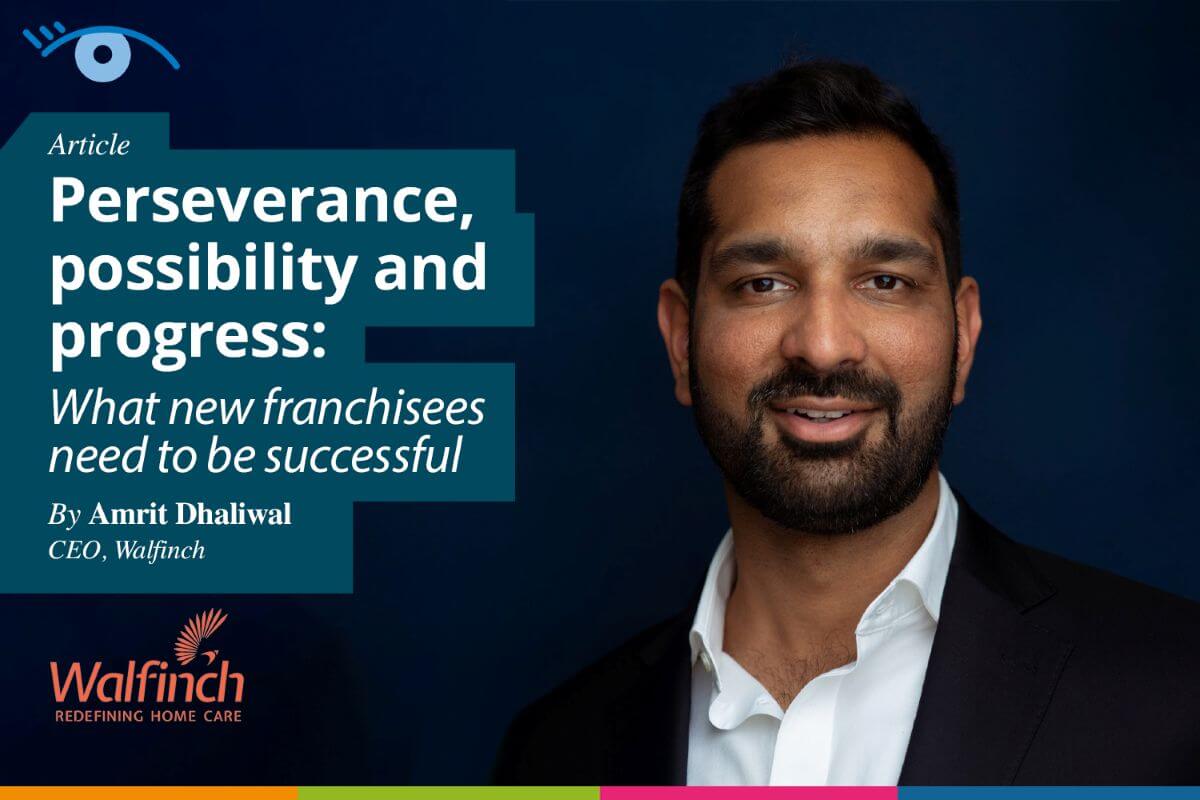
Listen, I get it. I’ve seen franchising from both sides. Contrary to popular belief, it’s not just about having enough cash – although the investment is important, the numbers don’t make or break an application.
Here’s what I, as a franchisor, look for in a potential franchisee.
Someone with grit: Perseverance
Franchising is hard work, especially in the beginning. You’re building from scratch, and it’s going to be tough. As a franchisor, I’m upfront about this and I expect potential franchisees to be upfront with me about whether or not they think they can hack it.
As a franchisor, getting the right people in and making informed recruitment. But it’s that perseverance – the ability to push through – that separates those applications from someone who’s ready and someone who’s not quite there yet.
Someone who fits our company culture: Possibility
Culture makes or breaks a business. That’s why you BOTH need to be honest about fit from day one. At Walfinch, we’re not just looking for people who can follow a system; we want individuals who embody our values: perseverance, possibility and progress.
A franchise is a long-term business relationship. If our ideals don’t align, it will fall apart later on. If I’m taking a call on a Friday night when something goes wrong, I need to know I’m speaking to someone who understands collaboration and values the support system in place.
The value of any franchise relies on getting the right people on the bus – because, truth is, it can be a bumpy ride! Ultimately, you need to be someone who can open themselves up to possibilities, to opportunities and new ways of thinking.
Someone who is teachable: Progress
Truth is, I didn’t start in home care franchising. My first business was in hospitality, and I moved into care later – introduced to it by my then-girlfriend (now wife!). Since then, I’ve gone from franchisee to CEO of a national home care company. The rest is history!
What made that possible? Teachability.
A franchisee who refuses to learn, adapt, or take guidance will struggle. At Walfinch, we focus on upskilling and continuous learning. The best franchisees are the ones who can say, “I don’t know how to do this—yet. How can I change that?” The ones who want to make progress.
As a franchisor, consistency and scalability are key to me – I’m not in the business of handing out fish for a night’s meal. Walfinch is about helping franchisees develop the skills to thrive for life.
Ready to steer the ship?
So, imagine this: you and your potential franchisor agree you’re a good fit. The paperwork is done, the numbers add up. Now, it’s time to put in the real work. Your focus should be on getting that first sale and breaking that first pound.
Take full advantage of the training provided. At Walfinch, we blend in-person and online sessions, workshops, and ongoing resources to put franchisees in the best position for success. We provide the tools – you pack your own rucksack!
As a franchisee, you’re not just buying a business; you’re buying into a shared vision for the future. Make sure the franchise model works for you, that the numbers align, and, most importantly, that you truly believe in it. Let’s thrive together.
Find out more about Walfinch opportunities...
How do you know when you’re ready to buy a franchise?

Much of Home Instead UK’s continued success is down to the effort, time and dedication of its franchisees in providing exceptional care for older people and running successful businesses. It’s really important to do your due diligence when looking for a franchise; you really shouldn’t go into something half-hearted. It’s so much better if you are genuinely interested in the brand, committed and in a great position to become a franchise owner. At Home Instead they are always delighted when people demonstrate they have done their homework and have all the signs of becoming a committed franchise owner.
But how do you know when you’re ready to invest in a franchise, and the right franchise?
Are you in a good financial position?
There are franchises for everyone and with very different entry costs, from under £10,000 to over a million. Consider how much you have available to invest. You will need to pay the franchisee fee, plus have working capital available to get started and to support you and your business. The good news is that the banks tend to look favourably on franchises because of their high success rate, so often lending is available.
How well do you understand the business?
You’re not just setting up a business; you’re also investing in an existing and often well-known brand. It’s essential to understand the ethos of the franchise, what they do, the quality of their products and services, the network and much more. Ask yourself, do I want to do this? Do I have the passion and drive to make a great success of this franchise? It needs to be something you can believe in and enjoy.
How well do you understand franchising?
Franchising offers the best of both worlds: you can own a business with a big name on a local level within your own community, with the added bonus you are not setting up alone. There is a business model for every franchise which is tried and tested. Franchisees follow the model and work within these guidelines, so it is important to understand that you are part of a network and the key is consistency for the brand and all it stands for.
Do you have the time?
Often people can think that owning a franchise is more like having a job, or they can have a job as well. It is unlikely you will be able to run a new franchise territory as a side project, especially the larger franchises. It requires full attention to be successful, but as you become established and employ more people, you can become more hands-off and work on the business, not in the business.
Are you open-minded when it comes to location?
Your chosen franchise brand may already be well-established and may not have territories available in the area you want. So, you may need to be open to travelling to your territory, or relocation to a new area might be required. All franchise territories are carefully mapped and selected in terms of their demographics, suitability for the business and their target audience, all of which support franchise owners in building a successful business.
Article by Luke Spellman, Franchise Development Manager, Home Instead UK, the No.1 home care franchise. Find out more about Home Instead Franchise Opportunity...
Is Now the Right Time to Give Up Your Job and Buy a Franchise?

The idea of leaving your job to become your own boss is enticing.
For many, buying a franchise seems like the perfect path to entrepreneurship—a way to run your own business with the backing of an established brand.
But is now the right time to take this leap?
Let's explore the factors to consider before trading your steady pay cheque for franchise ownership.
Assess the Economic Climate
The state of the economy plays a crucial role in the success of any business venture.
Before diving into franchise ownership, take a close look at current economic indicators:
- Consumer spending trends
- Unemployment rates
- Interest rates
- Inflation
A strong economy often means more disposable income for consumers, which can benefit many franchise types.
However, some franchise models thrive even in challenging economic times. Research how your chosen franchise category performs in various economic conditions.
Evaluate Your Personal Readiness
Owning a franchise isn't just a financial investment—it's a lifestyle change.
Ask yourself:
- Do you have the necessary skills and experience?
- Are you prepared for long hours and potential stress?
- How will this affect your family and personal life?
- Do you have a support system in place?
Be honest about your readiness to take on the challenges of business ownership.
Some franchises offer extensive training, while others expect you to hit the ground running.
Analyse Your Financial Situation
Franchising requires a significant financial commitment.
Consider:
- Initial franchise fee
- Ongoing royalty payments
- Start-up costs (equipment, inventory, real estate)
- Working capital for the first 6-12 months
Evaluate your savings, assets, and access to financing. Many franchisors have relationships with lenders, but you'll need a solid financial foundation.
Don't forget to factor in your personal expenses during the start-up phase when the business may not be profitable.
Research Franchise Opportunities
Not all franchises are created equal. Investigate potential franchises thoroughly:
- Read the Franchise Agreement and any documents carefully
- Speak with current and former franchisees
- Attend discovery days
- Consult with a franchise solicitor and accountant
Look for franchises with a proven track record, strong support systems, and values that align with your own.
Consider the franchisor's financial stability and growth projections.
Timing the Market
While there's never a "perfect" time to start a business, certain market conditions can be more favourable.
Look for:
- Emerging trends in your chosen industry
- Gaps in the local market that your franchise could fill
- Technological advancements that could give you an edge
Remember, even if market conditions seem ideal, success ultimately depends on your execution and dedication.
The Pros of Franchising
Franchising offers several advantages over starting a business from scratch:
- Established brand recognition
- Proven business model
- Marketing and operational support
- Bulk purchasing power
- Network of fellow franchisees
These benefits can significantly reduce the risk and learning curve associated with new business ownership.
The Potential Drawbacks
However, franchising isn't without its challenges:
- Less autonomy than an independent business
- Ongoing fees that impact profitability
- Potential for conflict with the franchisor
- Limited ability to innovate or change the business model
Carefully weigh these factors against the benefits to determine if franchising aligns with your entrepreneurial goals.
Making the Decision
Ultimately, the decision to leave your job for a franchise opportunity is deeply personal. Consider seeking advice from:
- A career counsellor
- Financial advisor
- Experienced franchisees
- Franchise consultants
These professionals can provide valuable insights and help you make an informed decision.
Conclusion
Buying a franchise can be a rewarding path to business ownership, but it's not a decision to be made lightly.
Take the time to thoroughly assess your readiness—both personally and financially. Research your options, understand the market, and be realistic about the challenges ahead.
If you've done your due diligence and feel confident in your ability to succeed, now might indeed be the right time to take the plunge.
Remember, timing is important, but your determination, skills, and willingness to work hard are ultimately what will drive your success as a franchise owner.
Whether you decide to make the leap now or wait for a more opportune moment, the key is to approach the decision with eyes wide open.
With careful planning and the right franchise fit, you could be on your way to building a thriving business and achieving your entrepreneurial dreams.
-















